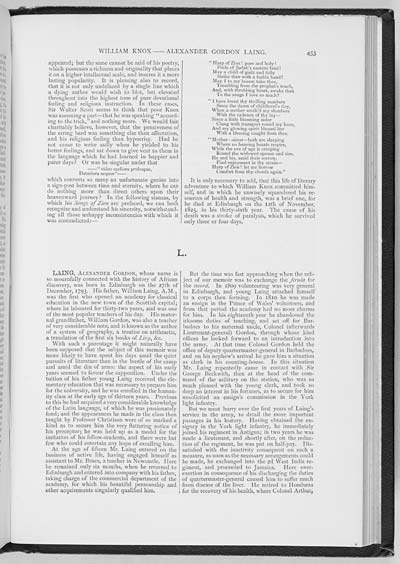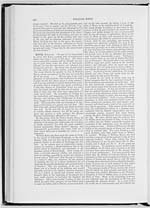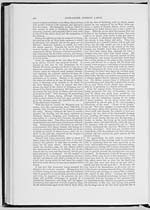Volume 2 > Half-Volume 4
(209) Page 453 - Laing, Alexander Gordon
Download files
Individual page:
Thumbnail gallery: Grid view | List view

453 appeared; but the same cannot be said of his poetry, which possesses a richness and originality that places it on a higher intellectual scale, and insures it a more lasting popularity. It is pleasing also to record, that it is not only undefaced by a single line which a dying author would wish to blot, but elevated throughout into the highest tone of pure devotional feeling and religious instruction. In these cases, Sir Walter Scott seems to think that poor Knox was assuming a part�that he was speaking " accord- ing to the trick," and nothing more. We would fain charitably believe, however, that the pensiveness of the erring bard was something else than affectation, and his religious feeling than hypocrisy. Had he not cause to write sadly when he yielded to his better feelings, and sat down to give vent to them in the language which he had learned in happier and purer days ? Or was he singular under that -----"video meliora proboque, Deteriora sequor"----- which converts so many an unfortunate genius into a sign-post between time and eternity, where he can do nothing more than direct others upon their heavenward journey? In the following stanzas, by which his Songs of Zion are prefaced, we can both recognize and understand his sincerity, notwithstand- ing all those unhappy inconsistencies with which it was contradicted:� " Harp of Zion ! pure and holy! Pride of Judah's eastern land! May a child of guilt and folly Strike thee with a feeble hand? May I to my bosom take thee, Trembling from the prophet's touch, And, with throbbing heart, awake thee To the songs I love so much? " I have loved thy thrilling numbers Since the dawn of childhood's day, When a mother sooth'd my slumbers With the cadence. of thy lay� Since a little blooming sister Clung with transport round my knee, And my glowing spirit blessed her With a blessing caught from thee. " Mother�sister�both are sleeping Where no heaving hearts respire, While the eve of age is creeping Round the widowed spouse and sire. He and his, amid their sorrow, Find enjoyment in thy strain� Harp of Zion ! let me borrow Comfort from thy chords again." It is only necessary to add, that this life of literary adventure to which William Knox committed him- self, and in which he unwisely squandered his re- sources of health and strength, was a brief one, for he died at Edinburgh on the 12th of November, 1825, in his thirty-sixth year. The cause of his death was a stroke of paralysis, which he survived only three or four days. L. LAING, ALEXANDER GORDON, whose name is so mournfully connected with the history of African discovery, was born in Edinburgh on the 27th of December, 1793. His father, William Laing, A.M., was the first who opened an academy for classical education in the new town of the Scottish capital; where he laboured for thirty-two years, and was one of the most popular teachers of his day. His mater- nal grandfather, William Gordon, was also a teacher of very considerable note, and is known as the author of a system of geography, a treatise on arithmetic, a translation of the first six books of Livy, &c. With such a parentage it might naturally have been supposed that the subject of this memoir was more likely to have spent his days amid the quiet pursuits of literature than in the bustle of the camp and amid the din of arms: the aspect of his early years seemed to favour the supposition. Under the tuition of his father young Laing received the ele- mentary education that was necessary to prepare him for the university, and he was enrolled in the human- ity class at the early age of thirteen years. Previous to this he had acquired a very considerable knowledge of the Latin language, of which he was passionately fond; and the appearances he made in the class then taught by Professor Christison were of so marked a kind as to secure him the very flattering notice of his preceptor; he was held up as a model for the imitation of his fellow-students, and there were but few who could entertain any hope of excelling him, At the age of fifteen Mr. Laing entered on the business of active life, having engaged himself as assistant to Mr. Bruce, a teacher in Newcastle. Here he remained only six months, when he returned to Edinburgh and entered into company with his father, taking charge of the commercial department of the academy, for which his beautiful penmanship and other acquirements singularly qualified him. But the time was fast approaching when the sub- ject of our memoir was to exchange the ferula for the sword. In 1809 volunteering was very general in Edinburgh, and young Laing attached himself to a corps then forming. In 1810 he was made an ensign in the Prince of Wales' volunteers, and from that period the academy had no more charms for him. In his eighteenth year he abandoned the irksome duties of teaching, and set off for Bar- badoes to his maternal uncle, Colonel (afterwards Lieutenant-general) Gordon, through whose kind offices he looked forward to an introduction into the army. At that time Colonel Gordon held the office of deputy quartermaster-general in Barbadoes, and on his nephew's arrival he gave him a situation as clerk in his counting-house. In this situation Mr. Laing repeatedly came in contact with Sir George Beckwith, then at the head of the com- mand of the military on the station, who was so much pleased with the young clerk, and took so deep an interest in his fortunes, as to secure for him unsolicited an ensign's commission in the York light infantry. But we must hurry over the first years of Laing's service in the anny, to detail the more important passages in his history. Having obtained the en- signcy in the York light infantry, he immediately joined his regiment in Antigua; in two years he was made a lieutenant, and shortly after, on the reduc- tion of the regiment, he was put on half-pay. Dis- satisfied with the inactivity consequent on such a measure, as soon as the necessary arrangements could be made, he exchanged into the 2d West India re- giment, and proceeded to Jamaica. Here over- exertion in consequence of his discharging the duties of quartermaster-general caused him to suffer much from disease of the liver. He retired to Honduras for the recovery of his health, where Colonel Arthur,
Set display mode to:
![]() Universal Viewer |
Universal Viewer | ![]() Mirador |
Large image | Transcription
Mirador |
Large image | Transcription
Images and transcriptions on this page, including medium image downloads, may be used under the Creative Commons Attribution 4.0 International Licence unless otherwise stated. ![]()
| Biographical dictionary of eminent Scotsmen > Volume 2 > Half-Volume 4 > (209) Page 453 - Laing, Alexander Gordon |
|---|
| Description | Spine title: Half-Vol. IV. Heriot to Lynedoch. |
|---|---|
| Description | Volume II. Contains names alphabetically from Falconer to Lynedoch. |
|---|

